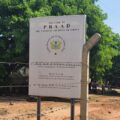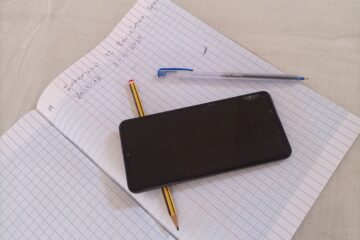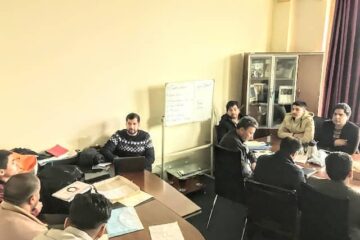by: Jennifer Hart, Wayne State University
I was going to write a different book. For the last five years, I had been planning a book that traced debates about the shape of Accra, Ghana’s capital city, from the late 19th century through the present. My last book on the history of motor transportation in Ghana (Ghana on the Go) highlighted the power of grassroots planning, development, and infrastructure. As that book demonstrated, people in colonial and postcolonial Ghana frequently appropriated technology like roads and motor vehicles for their own purposes, defying government plans and crafting alternative infrastructures that responded to and supported the needs and aspirations of the community. In Accra, in particular, the emergence of grassroots public transport – known as the trotro – came to define the city, not just as a symbol but as a deeply-rooted mobility system that both reflected and shaped the social, cultural, economic, and political life of the city.

Study Abroad students listen and learn from long-time research collaborators at the La Drivers Union in Accra, July. Photo credit: Jennifer Hart
Over the last five years I have been working with local entrepreneurs, politicians, academics, artists, and other residents to explore these histories further. In that research – like Ghana on the Go – I planned to employ a range of methodologies, including archival research, participant observation, and extensive interviews. This summer I was supposed to begin a major period of interviewing in Accra. And then COVID. The pandemic canceled this research for my book – work that is essential for my promotion, timely in light of global conversations about sustainable development, implicated in ongoing collaborative research projects, and part of dynamic conversations within Ghana. It also resulted in the cancellation of my planned study abroad program, where an interdisciplinary group of US and Ghanaian students were going to collaborate with drivers in Accra to co-produce plans to redevelop the city’s transport system in a way that puts drivers’ and passengers’ interests and voices at the center of policy. There were other potential collaborative projects, too – public history exhibits and documentary films, the release of a digital humanities project, and the digitizing of a major archive. This kind of applied humanities research is part of my broader research agenda, but it also mattered to long-standing collaborators. Much of this went on hold as we waited – for treatment, for a vaccine, for effective public health measures.
I could have also put the book on hold, hoping to be able to pick research back up again when the pandemic finally ended or when travel was safer. But, as I looked more closely at the archival material I had already collected, it became clear that another kind of project was possible. Not a project that I ever envisioned, but one that would make an important contribution all the same. This project would be almost exclusively archival, drawing on materials I had been collecting in Ghana and the UK as well as digitized newspapers. When it became clear that I had missed some files, I reached out to colleagues who also did research on the history of Accra and asked if they would be willing to share their notes and photos. I publicly offered to do the same for anyone who needed them – not everyone has the same access to digitized research materials and we should do whatever we can to expand access during this moment. Other opportunities also presented themselves – Instagram takeovers that expanded the reach of my research and brought me into conversation with new groups of people; virtual talks that allowed me to be in conversation with colleagues in Ghana and around the world; collaborative writing with young scholars, geared toward both academic and public audiences. It’s different. It’s not worse. In fact, it may be better – it forced me to grapple with archival sources in a way that I would not have done otherwise. This book is now a history of informalization and the regulation of space and spatial practice in Accra. It engages seriously with issues of policy that may facilitate more direct conversations with communities of practice. And, by focusing on the roots of a term widely used but rarely defined, it makes a direct intervention in an interdisciplinary conversation that has both academic and practical implications. In other words, while it’s not the book I originally intended, I think it will still make valuable contributions.

Digital footprints of collaborations and pandemic presentations and publications to diverse audiences. Photo credit: Jennifer Hart
There are various reasons why my transition ended up being productive. Some of it is experience. This kind of research adjustment isn’t completely unheard of. Before I began my fieldwork in grad school, I heard about colleagues and mentors who had to completely change their field sites, learn new languages, and shift methodologies due to extraordinary conditions beyond their control. In the context of my own dissertation research, I also had to make adjustments. I went to Ghana first in 2007 intending to study the public culture of religion and its role in shaping community in an Accra suburb (Madina). But in attempting to do pre-dissertation research, I found that my topic would be nearly impossible to research from a historical perspective – or at least too difficult for me to imagine in that moment with my limited research experience. In interviewing and listening deeply to research informants, however, I was confronted with a topic – the history of drivers and driving – that was frankly much more compelling. The research shifted again and again over the course of that year, particularly as I had to confront assumptions – my own and that of the archives. This, of course, is really what you want. Research conclusions that emerge from the data. In other words, I had been faced with these sorts of demands for flexibility before, and I think it’s helpful in some ways to think about current challenges in light of this longer history of research practice.
But the pandemic also presents unique conditions. Ultimately, when my dissertation project idea fell through, I was able to write a new proposal and follow through with the research in my fieldsite; this is not possible for many of us right now. In this moment when our physical mobility is restricted, we have to embrace a form of academic generosity that recognizes our interdependence as a community and embraces the possibilities of new forms of scholarship and scholarly thinking. What might that mean (or, at least, what did it mean for me)?:
- Ask for help, but also openly offer assistance in return. This is not the time to protect sources. Institutional access to digital repositories and financial resources to support travel, sabbaticals, etc. is highly uneven across US institutions and abroad. Be willing to share and be publicly grateful for assistance.
- Explore the possibilities of social media as a research tool and a scholarly community while still being careful and critical about the embrace of digital sources. They require the same kinds of contextualization as archival and oral sources, and they cannot tell you everything. As more of us reach for the digital out of necessity, it’s important to remember that there are scholars and scholarly fields out there engaged in critical reflection on these methods and sources (e.g. digital humanities, critical data studies, information science, media studies), and you should take time to dive into that scholarship just as you would anything else. We cannot and should not take the digital (in whatever form) for granted.
- Embrace slow scholarship and the idea of scholarship on different scales, including public-facing work that can be generative in important ways. Long, slow-burning or slow-building projects can take a bit of a hiatus. Shorter-term output, including public-facing scholarship, can keep your research agenda active and help you develop new perspectives and audiences. Think broadly about the venues available to you and reach out in collaborative spirit and support if you’re interested.
- Embrace the possibilities of collaboration. More established scholars, in particular, should consider ethical collaborations with junior colleagues (including students) as a way to share resources and support the work of people earlier in their careers, for whom this temporary work stoppage may have more profound consequences. These are mentorship opportunities as well as research opportunities, and you should reflect on what that means with your collaborator.
- Be transparent about your sources and their limits. You may not be able to answer all of the questions. But you may be able to look at an old source in new ways. Or, as I have, you may be able to take a deeper dive into the details of what might have been only one piece of a project before the pandemic. Just don’t claim more for it than the sources support.
- Only commit to research/writing that helps you achieve your goals. How you define those goals, however, is up to you. For some, income matters a great deal right now and taking research contracts is essential. For others, activism is central to their mission. For still others, teaching or public scholarship or book publication or dissertation completion are essential. There’s no judgment implied here. Everyone should do what makes best sense for them. But at a time when we all feel overwhelmed by the demands on our time and energy, being strategic about what you commit to is critical.
These ideas might be helpful for you, but it’s also equally helpful to recognize that a productive transition during this time is the result of significant privilege. You may have noticed that childcare and/or parental care are missing from the list of priorities above. That’s not because I don’t recognize them as important – they are critically important for many academics, and women in particular have noted the challenges of working from home in a time when they’re also having to care for and educate children. These are not issues I face, however. And, while some of the strategies I’ve employed might be helpful, I wouldn’t presume to know what that experience is like or the best ways (if any) that one might deal with it.
I also work at a research university where I have a low teaching load, and pre-COVID I had been awarded a fellowship for this year, which lightened my load further. I’ve taken on additional service work and done a lot to support various offices around campus in part to compensate for the stress that I know others are under. But, my work life is significantly less stressful than colleagues who are teaching 4 courses or more, newly online, with no assistance.
I’m also not up against a deadline. My dissertation is long finished, I got tenure several years ago, and there is no looming deadline for my book other than the one in my own head. I was also in the middle of a project, rather than at the beginning, and I had already done a lot of the research necessary to write something, at least. The challenges of research during COVID fall considerably harder on graduate students who were just beginning, or in the middle of, their dissertation research, or faculty who are facing a tenure clock.
My experience probably isn’t helpful in those situations, but I would gladly talk to you if you want to think about options. Generosity and community extended here.





